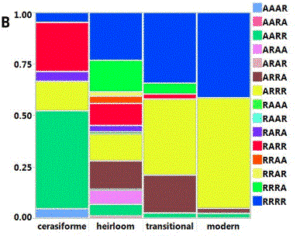Tomato flavor! Scientists nail it.
I am a long-time reader of Science Magazine and every now and then come across an article I just love.
My latest favorite is a study titled “A chemical genetic roadmap to improved tomato flavor.”
As any grower of backyard (or, in my case, terrace) tomatoes can tell you, the most delicious tomatoes wonderfully balance sweetness, acidity, and flavor.
As the authors understate in their Abstract, “Modern commercial tomato varieties are substantially less flavorful than heirloom varieties.”
To correct this problem, they identified flavor-associated chemicals in 398 modern, heirloom, and wild tomato varieties. These chemicals are present in minute (picomolar, nanomolar) amounts and hard to identify.
But any tomato grower could have told them what they found:
Modern commercial varieties contain significantly lower amounts of many of these important flavor chemicals than older varieties.
The investigators also identified the genes responsible for sugars, acids, and volatiles.
They found:
A total of 13 flavor-associated volatiles were significantly reduced in modern varieties relative to heirloom varieties. Volatile chemicals define the unique flavor of a tomato and are essential for consumer liking. Thus, poor flavor of modern varieties can largely be attributed to the dilution of many flavor volatiles that positively influence liking. This dilution of flavor chemicals should be correctable by reintroducing superior alleles of genes controlling their synthesis.
They did a couple of other things
Analysis of [genetic] loci impacting sugar content provides a cautionary tale regarding crop domestication and improvement. We identified two loci …that have significant associations with glucose and fructose content on chromosomes 9 and 11 …Both of these loci are located within regions previously identified as being within both domestication and improvement sweeps, indicating early and continued selection for larger fruit…Taken together, the negative correlation between fruit weight and sugar content in S. lycopersicum is likely associated with the loss of the high-sugar alleles during domestication and improvement as ever-larger fruits were selected..
Translation: Tomatoes bred to be bigger have less sugar. Smaller tomatoes are sweeter .
Grow cherry tomatoes (Sun Golds—yum).
Here’s one of the illustrations, in this case showing the variation in genes for certain flavor chemicals in various kinds of tomatoes.


